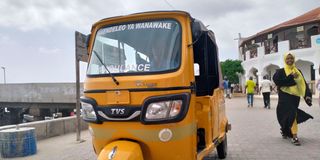Tuk tuk ambulances saving expectant mothers in Lamu Island

A tuk tuk ambulance in Lamu Old Town. following the introduction of tuk tuk ambulances early this year, pregnant women are now able to seek medical attention on time.
What you need to know:
- Lamu archipelago has since time immemorial been defined by old modes of transport.
- Without motorised transport, residents use donkeys, dhow boats and handcarts to move around. Not even bicycles, let alone motorbikes and vehicles, are allowed in the town.
For Halima Shee, a resident of Mkomani in Lamu County, giving birth was a near-death experience.
In 2016, she almost miscarried as she was being rushed to King Fahd Hospital on Lamu Island.
“That fateful day I was rushed to the hospital in a speed boat. The journey was too rough and rocky due to strong winds and waves at the sea. Getting to the hospital from the sea was also a challenge because there are no motor vehicles allowed on the island except for those with exceptions from the government,” says Halima.
Halima’s experience is a testimony to the struggles of the majority of pregnant women in Lamu archipelago, which has since time immemorial been defined by old modes of transport. Without motorised transport, residents use donkeys, dhow boats and handcarts to move around. Not even bicycles, let alone motorbikes and vehicles, are allowed in the town.
But following the introduction of tuk tuk ambulances early this year, pregnant women are now able to seek medical attention on time.
The three-wheeled rickshaws operate within the Lamu Old Town central business district and the island’s outskirts of Kashmir, Wiyoni, Bombay, Kandahar and Hidabo.
Lamu Old Town was listed as a Unesco World Heritage site in 2001. In 2015, Westernised forms of transport such as vehicles, motorcycles, and bicycles were banned from operating to preserve the town’s unique age-old culture and heritage, which is said to be on the verge of extinction due to “excessive westernisation”.
Before the introduction of the tuk-tuk ambulances, expectant mothers and children suffered the most as they used to be ferried to the King Fahd County Hospital in handcarts, donkeys and boats. These modes of transport were not only uncomfortable, but also caused birth complications due to the rocking nature of ferrying the mothers to delivery rooms.
Fatma Salim, Maendeleo ya Wanawake National vice-chair, who is the brainchild of tuk-tuk ambulances, said they approached the county leadership before they were given the go-ahead to introduce the ambulances.
“After witnessing the suffering that pregnant women, children and the elderly were facing while seeking medical attention, we sold the tuk-tuk ambulance idea to the county government. That’s how the proposal was adopted,” said Ms Salim.
The initial plan was to provide free transport services, especially for expectant mothers, on condition that the county government and well-wishers would chip in and fuel the tuk tuks as well as be in charge of their maintenance. Unfortunately, the support was not offered as expected.
The women’s lobby, therefore, had to look for other alternatives to maintain the tuk tuks. Ms Salim said since they are also financially incapacitated, they had to agree that tuk-tuk ambulance drivers charge between Sh50 and Sh100 for the services provided.
Wilson Kazungu, a tuk-tuk ambulance driver, said their operation has eased the movement of people living within the old town where automobiles are out of bound.
The lives of patients in hard-to-reach areas of Lamu Island like Kashmir, where the road is sandy for boda bodas to operate, also benefit from the tuk tuks.
He says more women are now choosing to give birth in the hospital with the tuk-tuk ambulances being in place.
“Medical services are nowadays easily accessible to the islanders. We ferry expectant mothers with complicated cases to their delivery rooms. Our phone numbers are out for everyone with emergency cases to call us at any time. This has really worked,” said Mr Kazungu.
The tuk-tuks’ prices are affordable compared to boats and motorcycles ,where one might end up spending hundreds or even thousands of shillings just to get to the King Fahd County hospital on the far end of the island.
Abubakar Yusuf, the tuk-tuk ambulance drivers’ spokesperson, stressed that tuk-tuks are a blessing for the town dwellers as pregnant mothers and patients no longer get complications emanating from the rocking nature of boats and motorcycles.
He appealed to the county government to allow more tuk tuks to operate within the historical town to enable them to effectively deal with the many emergency cases that sometimes overwhelm them.
“Initially, we were four tuk tuk drivers but the fear that we could be chased out of the town at any time prompted one of us to move to Malindi. The county should consider allowing us to freely operate these ambulances. In fact, let them allow more of these tuk tuks to be brought to the old town. They’ve proved helpful to the society here,” said Mr Yusuf.





